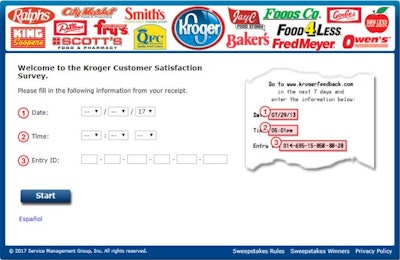
It is very common to see the URL for an online survey printed on receipts from grocery stores and restaurants, in which the companies want you to offer feedback on how satisfied you were with your experience as a customer.
By simply taking five minutes out of your day to complete a survey, you are often rewarded with things such as a free order of fries, a free cup of cola or a discount on your next fuel purchase. Since I am what you might want to refer to as “thrifty,” I have a tendency to fill out some of these surveys.
Don’t limit your comments to in-store experience
At Dillons stores, which are affiliated with Kroger, receipts will have information to go to a website and fill out a survey. When you complete the survey, you earn 50 fuel points, which puts you halfway to a dime per gallon discount off of a fuel purchase. You’d have to spend $50 in groceries to otherwise get those 50 points, so if you have the time, it’s worth it.
After a recent shopping trip to Dillons, I filled out a survey. In answering the questions, I marked nearly all of the “highly satisfied” ovals. I had no reason not to. The store was clean, the staff was friendly, items were easy to find, prices were reasonable, the check-out lines were reasonably short, and there were no stray shopping carts making it difficult to navigate the parking lot.
But for some reason, I didn’t mark “highly satisfied” with the question concerning the overall shopping experience.
When the survey asked me to explain why I wasn’t highly satisfied, a bulb lit up. I went on to say that I had a hard time supporting a business such as Kroger, which signed a pledge to sell only cage-free eggs, claiming it was because of customer demand and not activist demand. I stressed that I valued consumer choices and affordable food options. I then went on to say that I would be even more reluctant to shop at Kroger stores if it vowed to exclusively source chicken meat from slower-growing broilers, which is the latest activist initiative.
A week or two later, I was having supper with my son at his favorite quick service restaurant. That restaurant's parent company has made several purchase pledges claiming consumer demand for what it called better animal welfare practices. He saw on the back of the receipt that you could get something free if you filled out the survey. Hmm. Maybe we’re onto something here. Suddenly, filling out these forms became important for purposes unrelated to getting free stuff.
Give companies a clear picture of customer demand
I’ve heard farmer-friendly restaurant chains like Domino's and Culver’s talk of how they consistently hear from animal rights activists who are pushing these agendas.
Those who disagree with the activists need to make their voices heard as well. These surveys are a good way to do that. There is no guarantee that your survey will contribute to policies concerning its supply chain for meat, poultry, eggs, or dairy products, but at least you can communicate your views. It’s like the old adage about satisfaction with government goes, “If you don’t vote, don’t complain.”


















